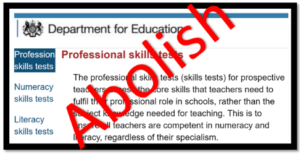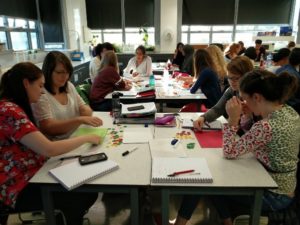Written by Gwen Ineson
What’s the point of the professional skills tests?
I qualified as a teacher in 1995, five years before the statutory professional skills test came into effect – which I’m very pleased about as I don’t know how I would have fared in these tests! In this blog I will provide some context about what these tests are, why they were introduced, and why I think they should be abolished – I don’t think I’m alone in this opinion!
History of the skills tests
Professional skills tests became a statutory requirement for achieving QTS in England in 2000. At that time there were tests in numeracy, literacy and information and communication technology – but this was dropped in 2012 because ‘it was no longer needed’ (DfE, 2011b: p.5). Tests were taken by students in their final year of their initial teacher education (ITE) course and they had an unlimited number of attempts to pass them. The numeracy skills test involves prospective teachers (for any subject and any age phase) sitting in a registered test centre, at a computer screen, with headphones on. The first 12 questions are mental arithmetic questions which are heard through the headphones and no visuals appear on the screen. Test centres may provide paper or mini white boards for jottings, but the solution must be typed, using the computer keyboard, within 18 seconds. The rest of the paper comprises sixteen written questions which involve interpreting and using data and solving arithmetic problems.
In 2012 Michael Gove announced a series of changes to these tests, to ‘to ensure that they are testing candidates to meet rigorous standards of literacy and numeracy’ (DfE, 2011b: p.5). The first was that they became a prerequisite for being offered a place on an ITE course. This had significant implications for ITE providers and as a result, numbers of students on QTS programmes became volatile, linked, in part, to a further change at the same time, which was that applicants would only have three attempts to pass these tests, after which they would be locked out for two years. This meant that ITE providers could only make conditional offers to their applicants if they hadn’t passed the skills test and each year providers didn’t know how many of their ‘offer holders’ would meet this condition to enrol on the programme. The final change was that the pass mark was raised. This was a rather peculiar development, given that Michael Gove had also recently announced that academies and free schools could employ teachers who did not have QTS. So, with one hand he was raising the expectation for teachers nationally, whilst with the other he was reducing it!
The most recent change to these tests was in February this year, with Nick Gibb announcing that applicants to QTS programmes would once again have an unlimited number of attempts at these tests, with no lock out period. The first three attempts are now free for applicants but there is a fee for any further attempts. This news has broadly been well-received. However, there are some who see this as a ‘dumbing down’ of the profession – a perspective which I argue below, is misguided!
Relevance
For anyone to be considered for a place on an ITE programme, they must have at least a grade C in maths at GCSE. Few of the questions on the test require anything beyond a knowledge of the KS3 maths curriculum, so what is the purpose of these additional tests? The DfE published a report on the outcome of a consultation on ‘Training the next generation of outstanding teachers’ (DfE 2011a). Responses to questions about enhancing the ITE selection process suggested that ‘the GCSE requirement should be relied on with the skills tests dropped altogether, or, that the GCSE requirement could be replaced with pre entry skills tests’ (DfE, 2011a: p.3). Neither of these suggestions were followed up – teachers are required to meet the GCSE requirement and the skills test requirement.
Most providers of ITE include some sort of maths audit as part of their selection process and at the institution that I work at, this involves problem solving. We advise candidates that there is no strict time limit, but that we expect them to finish the audits in approximately an hour and a half. We’ve found that this gives a better indication of mathematical understanding, it reduces anxiety, and we rarely have anyone left after an hour and a half. The DfE suggest that the professional skills tests assess ‘the core skills that teachers need to fulfil their professional role in schools… to ensure all teachers are competent in numeracy and literacy, regardless of their specialism’ (DfE, 2018: para.1). However, how realistic is it that a teacher during the course of their day would be required to solve a problem such as the one below? If they were required to how likely is it that they would be required to do so in 18 seconds? (And who doesn’t have a calculator at the end of their arm nowadays anyway?!)
A school’s policy for Key Stage 2 was to set three and a half hours of homework per week.
What was the mean number of minutes to be spent on homework per weekday evening?
Anxiety and speed
Maths is often considered to be a subject which causes considerable anxiety (Dowker, 2016; Bibby, 2002). Part of the reason for this is that it is seen by many as a subject of right or wrong solutions, which require the memorisation of numerous facts and formulae etc. What I find enjoyable about teaching maths to prospective primary teachers is that although for many, it is the subject that they are most anxious about when they start the course, by the end they regularly report that it is their favourite subject to teach. It could be argued that this is because through learning to teach maths, their own understanding develops so that they no longer view it as a rigid subject, but one with multiple approaches and scope for creativity. However, prior to the confidence building work that forms part of our ITE provision, having to take another test in mathematics, and one which includes individual timed items, reinforces the view that maths is a subject to be rote learnt.
Many have written about the harmful effect that focusing on speed has on the enjoyment of maths (Boaler, 2015; Tobias, 1993; Gilliland, 2001) and the ability to perform in tests (Beilock, 2011). Jo Boaler writes about mathematician Laurent Schwartz, who suggests that ‘rapidity doesn’t have a precise relation to intelligence. What is important is to deeply understand things and their relations to each other. This is where intelligence lies. The fact of being quick or slow isn’t really relevant.’ (Schwartz, 2001: p.30). It feels odd that we’re testing the suitability of prospective teachers by how quickly they can respond to mental arithmetic questions. Requiring candidates to complete the mental questions so quickly (they can’t go back to any question later on) is likely to increase their anxiety and therefore, as Beilock (2011) suggests, makes them less likely to pass the test. I mentioned above that I didn’t know how I would fare on these tests, precisely because of the speed factor. I have no doubt that I would be able to answer the questions on the test, as I’m sure most prospective teachers would, but having the clock ticking would be a significant barrier to my ability to work quickly.
Flexible approach to calculation
I was teaching in a primary school in North London at the launch of the National Numeracy Strategy, and, although it had its critics, I welcomed the emphasis on informal mental calculation. When I moved to work in Initial Teacher Education in 2005, I enjoyed working with pre-service teachers to help them become confident in using a range of mental calculation strategies (this became the focus of my doctorate). At that time many of my PGCE students were revising for their skills tests (as they could take the tests during their course) so this provided opportunities to consider various possible responses to some of the test questions. (Also at that time on primary PGCE programmes there was more time to work with our students as they only had to complete 18 weeks of school experience, compared with the current requirement of 24 weeks). Over the year, this allowed pre-service primary teachers opportunities to build their repertoire of informal calculation strategies, which they could use in their mathematics teaching, but it also ensured that they had a wide range of strategies that they could draw on to solve the problems on the mental arithmetic section of the numeracy skills test. Whilst I would have preferred not to have spent so much time helping students prepare for the test, the previous process provided scope for identifying a range of strategies to use for various test questions. The anxiety that many prospective students experience with the current testing arrangements means that their preparation for the test is likely to involve rote learning of algorithms.
Teacher recruitment
There is currently concern over the recruitment of teachers (NAO, 2017). Many ITE providers haven’t been able to meet their targets and as a result we have an ongoing shortage of teachers in this country. The government has been slow to address this problem but there have been two recent announcements that have sought to address this situation. The first was that all ITE providers received a letter from the DfE to say that a lack of experience in schools should no longer be a barrier to entering the teaching profession. The second, and welcome change, is that prospective teachers now have an unlimited number of attempts to pass the professional skills test. This will go some way to relieve the anxiety of knowing that there are a limited number of attempts before one is locked out for two years.
Final thoughts
I’ve argued above that there is really nothing to be gained by having these tests in place and actually, they potentially harm our profession. The tests are likely to put some people off embarking on a teaching career, they reinforce the idea that maths is an inflexible subject and that to be able to do maths, you must be able to do it quickly. The savings made by abandoning these tests could be used to provide much needed continuing professional development to support teachers to stay in the profession.
Gwen Ineson
Senior Lecturer in Primary Education
Brunel University of London
gwen.ineson@brunel.ac.uk
References
Bibby, T. (2002). Shame: An Emotional Response to Doing Mathematics as an Adult and a Teacher. British Educational Research Journal, 28(5), 705-721.
Beilock, S. (2011). Choke: What the Secrets of the Brain Reveal About Getting It Right When You Have To. New York: Free Press.
Boaler, J. (2015). Fluency without fear: Research evidence on the best ways to learn math facts. Stanford, CA: youcubed. Retrieved from https://www.youcubed.org/fluency-without-fear/. Accessed 11th April 2018.
Dowker, A., Sarkar, A., & Looi, C. Y. (2016). Mathematics Anxiety: What Have We Learned in 60 Years? Frontiers in Psychology, 7, 508. http://doi.org/10.3389/fpsyg.2016.00508
Department for Education. (2011a). Training our next generation of outstanding teachers. Consultation report. November 2011. Crown copyright.
Department for Education. (2011b). Training our next generation of outstanding teachers. Implementation plan. November 2011. Crown copyright.
Department for Education. (2018). Professional Skills Tests. Available at http://sta.education.gov.uk/ accessed 9th April 2018.
Gilliland, K. (2001). Families ask: The need for speed in mathematics. Mathematics Teaching in the Middle School, 7(4): 216–217.
National Audit Office. (2017). Retaining and developing the teaching workforce. Available at https://publications.parliament.uk/pa/cm201719/cmselect/cmpubacc/460/460.pdf accessed 9th April 2018.
Schwartz, L. (2001). A Mathematician Grappling with His Century. Birkhäuser.
Tobias, S. (1993). Overcoming Math Anxiety Revised and Expanded. New York: Norton.



